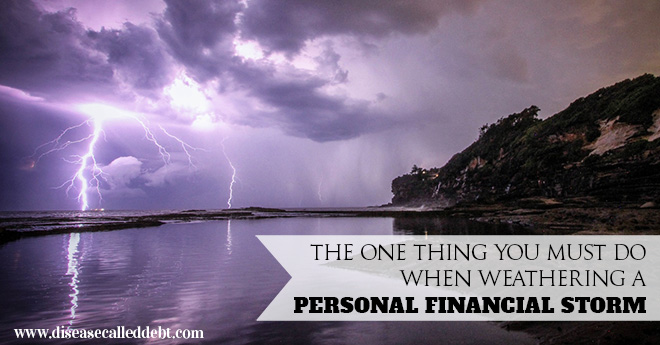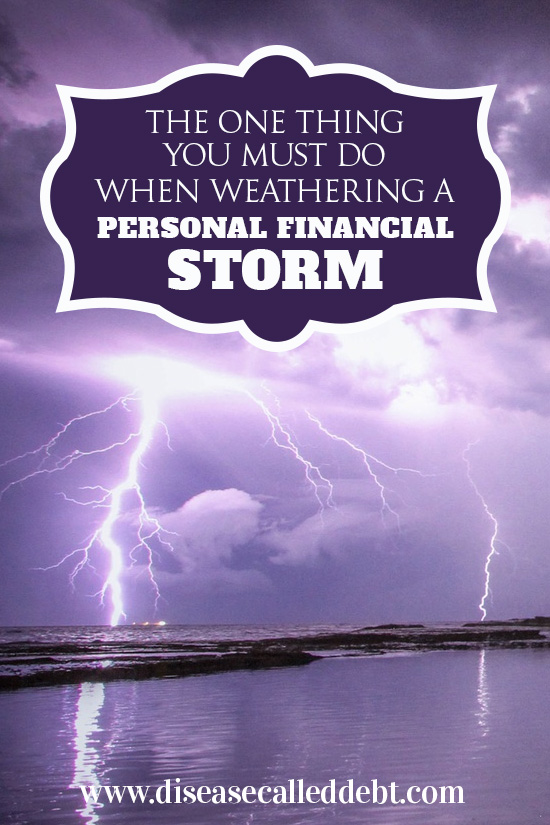I have another great guest post for you today from Richard Greaney who blogs over at DIY Money Mastery. In this post he explains how he dealt with an onslaught of unexpected costs using a clever budgeting and forecasting technique. Please head on over to his blog after you’ve read this post!
Most of us have a story about how we became the financial ace we are today.
It usually begins with a gradual slump, followed by a realisation of hitting rock bottom, then a long and slow process of climbing back to normal again. A great number of people who go through this will tell you that realisation of the magnitude of their debt was their ‘rock bottom’. For me, things were a little different.
My marriage ended at the beginning of 2015, and as they often tell you, separation doesn’t come cheap. But one of the things I’m eternally grateful for is how much that experience taught me about managing money when things are extremely tight.
Usually, when people talk about how they paid off debt, it was a case of realising their debt needed to be paid, then paying it off through some amazing feats in frugal living. In my case, it was quite different.
The first three months after separating consisted of a well-spaced but constant barrage of unexpected costs, many of which were into four figures, that kept coming at me. Some costs continued for six, and even twelve months, leaving me with a total of just over $12,000 of costs that were over and above normal everyday expenses.
Note, this doesn’t include costs like property rates and vehicle registration, which also conveniently showed up right at the beginning when I was broke.
Now, if someone had told me I was to take a pay cut of $12000 after tax for the year, I would have coped. But that wasn’t the way the system was prepared to treat me. Once they had asked for my money, they wanted it now or soon, and in large sums too. The only two payment options I had were cash and my personal credit card.
I couldn’t put any costs onto the mortgage, as is often the case with legal fees when buying or selling a property, as I was dangerously close to borrowing 80% of the value of my house as it was. Higher than that would have cost me dearly through higher interest rates.
I couldn’t use the joint credit card that was transferred from our marriage, as it was essentially still shared debt, and could only ever reduce. My own personal credit card was always there as an option, but that would mean accumulating more interest, in addition to the interest the debt on the joint credit card was costing me.
So, I worked out, I really needed to manage this all with cash. But how?
I used my “projected balance”
I thought hard about it, and I figured something out – I probably had the money, if you took my salary spread across the year and put it into one lump sum. But as I couldn’t get that, perhaps I could still do some creative accounting with money from my future self?
Not all these massive payments were due at the the same time, so if I paced myself, I could perhaps squeeze through. However, I couldn’t do this without full visibility of not just my present financial situation, but also, my future one.
When you get hit with a bill for $1000 that’s due in a month’s time, there’s at least one and possibly two pays between now and then.
What I could do, I surmised, was first establish exactly when every single credit and debit occurred in my account, as well as the exact amount. Once I knew that, I could then map out a future outlook, incorporating each scary invoice and its due date.
Finally, I could start thinking how I would pay for each. In a sense, I had moved from seeing my pay as a thing that happens every fortnight to seeing it as a chunk of a much larger amount.
But the concept didn’t seem to be in widespread use. I didn’t have time to post on forums and await responses, so decided to do it myself in Excel. I found all my automatic payments, the amount, and the frequency, and entered them in line by line.
Fixed costs were easy. Variable costs required me to set a maximum amount. The important thing was that I could now see every single critical cost for a two fortnightly cycle. Repeat that over and over, and add dates to show the actual day, and you get a projection of how your financial situation will be at any point.
Doing this, I quickly saw that I would be broke until June. “That’s great” I thought. “At least I know now”.
Doing this also opened up some other options I hadn’t considered before. While paying for things on my personal credit card would accumulate interest, this was only the case if the balance was unpaid for too long.
But if I bought something on the credit card with the objective of keeping cash in my bank account to allow me to pay a big bill by its due date, I could then pay down the credit card cost later, but before it started accumulating interest. There’s no way I could have achieved this level of clarity without a future projection.
It’s one thing to limp from payday to payday, transferring everything you save into the greedy arms of someone else (lawyers, tax department, a credit card bill you inherited from the marriage) but another when you know exactly how long it’s going to be for.
Not only did this help me get through the financial fallout of a separation, but by continuing to live this way, I finished the year with a surplus saving of around $5000, and another $2000 to pay for underfloor insulation to be installed in my house.
I now achieve the same outcome using the free app GNUCash, but soon intend to try out the online platform CalendarBudget to see if it’s any simpler to use.
So if you ever face uncertain financial times, you might want to try this method. It helped keep me sane when I needed it most.
_________________________________________
Author Bio: Richard Greaney is a laidback kiwi (that’s a New Zealander, not a fruit!) who enjoys writing and sharing his learning experiences with others. He has been an IT commentator, aviation photographer, freelance aviation journalist, and in more recent times, a blogger sharing his own journey of taking control of his finances. He believes there’s no secret to understanding money and running a profitable life. It’s all about being ready and willing to learn and master new skills, and to let go of beliefs holding you back from doing so. Read more about Richard at his site: DIY Money Mastery.
By subscribing, you'll receive new blog updates by email and occasionally I might email you with any exciting news. I promise not to spam you and your details will never be passed on.


12 Comments
Great article. I love how you were able to figure out a solution once you sat back and analyzed the situation. It can be so hard in the midst of a storm to think about a way out. Great read!
Thanks Becky. I’m really glad you found it useful.
Yes, there’s nothing quite like losing half your possessions and moving to shared custody of children to motivate you to batten down the hatches and focus on how to really make the most out of what you have. It was an amazing experience, and one I learnt so much from.
Richard at DIY Money Mastery recently posted…Why I charge myself interest, and why you should too.
This sounds like a more thorough version of what I do each month, enter future transactions in Quicken (my tracker of choice) to see exactly what my cash flow will be for the next month. It’s definitely useful whether you’re dealing with a financial crisis or simply trying to be more organized with your income and expenses. Glad it all worked out for you.
Absolutely. I still do it today, although not always to the same level of detail, for probably the same reason as you. In ‘peacetime’, you don’t quite feel the sense of needing to track every single cent the way you do in times of crisis.
Glad to hear others are using this method (and that quicken lets you do it too).
Wow, those are some serious money management skills you have, very well done!
I’ve done something similar when I was first trying to get a grip on our finances, it’s really hard work but it literally pays off. And though we don’t do this anymore for each month, it provided us with thorough knowledge of our financial situation.
Thank you!
It’s definitely a great tool to use when it’s needed. You can use it in tight times, when adapting to a revised personal budget, or even just to project things out in the medium term (eg debt repayments or savings accumulation).
Great job being able to forecast out into the future. So many people these days live paycheck to paycheck because they are not (and do not) want to sit down, look at their spending, and build a plan.
I totally agree. It’s all about taking control of your financial situation, rather than just letting ‘whatever happens’ happen to you, and dealing with the financial fall-out on a case-by-case basis. Something not a lot of people realise is that you can actually be in debt or broke but still be in control of your financial situation, if you’re moving in the right direction.
Richard, it’s good to know how you strategize during such financial storm. I agree with you that we should know what may happen in the future or be prepared for it at least. Emergency fund is really necesary.
Jayson @ Monster Piggy Bank recently posted…Potty Training To Save Money
Very much so. A healthy emergency fund is one of the most important thing people can do to create happiness in their lives, because it takes so much stress away from otherwise tense situations.
I’ve heard a lot about Calendar Budget and the more I hear about it, the more it makes me want to try it. It’s always important to create a plan for future and even “unexpected” expenses that life throws at you. I’m happy you were able to map out a plan of action to get through your financial setbacks. I guess they weren’t even setbacks though because your plan ended up allowing you to get ahead!
Sorry to hear about your separation 🙁 It really does wreak havoc in all areas of your life.
Wondered if you tried Pocketsmith? Sounds like the kind of thing that may have been helpful for this kind of cashflow management (and it’s homegrown!) I haven’t used it myself personally though.